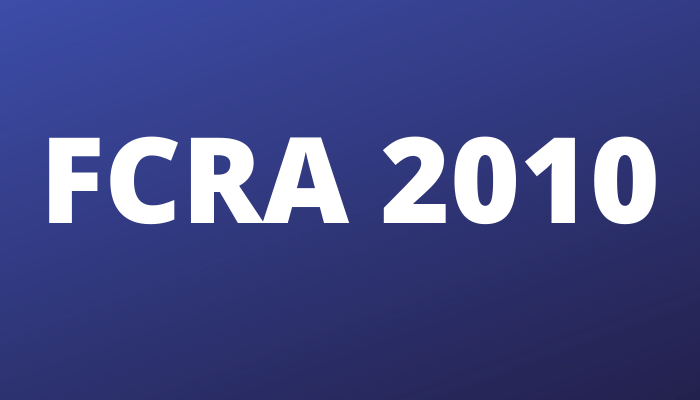The Foreign Contribution (Regulation) Act, 2010 regulates foreign donations to individuals, associations, groups, and NGOs.
As per available data, there are 22,762 FCRA-registered NGOs currently in India.
As per the law, even members of the legislature, political parties, government officials, judges, media persons are prohibited from receiving any foreign contribution. However, in 2017, an amendment to the law now allows political parties to receive funds from the Indian subsidiary of a foreign company or a foreign company where an Indian holds 50% or more shares.
Why regulations?:
- The Act seeks to regulate foreign contributions that could pose a danger to national interest or internal security by curbing foreign contributions motivated by political or religious objectives.
- Also, the Act aims at keeping a check on foreigners influencing the Indian electoral politics, journalists, public servants, etc.
What are its regulations:
- It is mandatory for all such NGOs receiving foreign funding to register under the FCRA. This registration is initially valid for five years and needs to be renewed subsequently.
- Registered associations can receive foreign contributions for stated social, educational, religious, economic and cultural purposes only.
- Filing of annual returns on the financial aspects is compulsory.
- Under the new rules notified in 2015, NGOs are required to give an undertaking that the acceptance of foreign funds is not likely to prejudicially affect the sovereignty and integrity of India or impact friendly relations with any foreign state and does not disrupt communal harmony.
Foreign Contribution Regulation Act (Amendment), Act, 2020:
- Aadhaar registration is made mandatory for people or organizations to receive foreign funds.
- The foreign contribution must be accepted only through an FCRA account in the State Bank of India, New Delhi branch.
- Only 20% of the foreign funds can be used for administrative purposes as against the earlier limit of 50%.
- It prohibits persons authorized under FCRA from transferring the received foreign contributions to any person/organization.
Powers under the Act:
- The Act empowers the Ministry of Home Affairs to suspend the licence of any entity not following the regulations set forth under the FCRA.
- The MHA on inspection of accounts and upon receiving any adverse input against the functioning of an association can suspend the FCRA registration initially for a period of 180 days.
- When the FCRA registration is suspended, the association cannot receive any fresh donation and cannot utilise more than 25% of the amount in the bank account without prior permission from the MHA.
- The MHA can also cancel the registration of an organisation which will not be eligible for registration or grant of ‘prior permission’ for three years from the date of cancellation.
Concerns:
Large number of cancellation of registrations:
Since 2011 the registrations of 20,664 associations have been cancelled for violations such as misuse of foreign contribution, non-submission of mandatory annual returns and for diverting foreign funds for other purposes.
Ambiguous terms:
The Act mandates that registered NGOs have to prove the source of funding and their utilization is appropriate and is not a threat to the “public interest” or “national security”. Given that these terms are not clearly defined in the Act, there is the possibility of misuse of this.
Delay in the processing of applications:
Thousands of applications of NGOs are yet to be scrutinized and renewed, as the deadline of 31st December to renew the registration of NGOs under the FCRA is reached.
Effect on the NGO ecosystem:
The stringent provisions under the Act have resulted in an estimated 30% drop in international non-profit contributions.
Recommendations:
While the need to regulate foreign funding and to ensure transparency and accountability in the receipt and utilisation of foreign contribution is non-negotiable, the regulations should not stifle the functioning of genuine non-governmental organizations or associations, who are working for the welfare of society.
Ever since independence, NGOs have played a crucial role in helping the needy in India, providing aid to the distressed and elevating the socio-economic status of millions in the country. Utilising funds raised through donations, NGOs in India work for a wide range of causes.
NGOs have acted as a bridge between the government and the common people. They have reached out to the marginalised communities and far off areas in India in multiple ways. Even during the ongoing COVID-19 pandemic, the relief work done by the NGOs is laudable.
The Government must give a more transparent account of its actions against NGOs.

